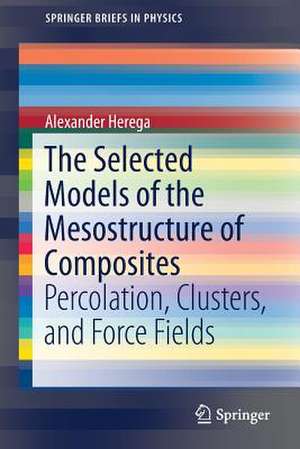The Selected Models of the Mesostructure of Composites: Percolation, Clusters, and Force Fields: SpringerBriefs in Physics
Autor Alexander Heregaen Limba Engleză Paperback – 12 iun 2018
Din seria SpringerBriefs in Physics
-
 Preț: 477.94 lei
Preț: 477.94 lei -
 Preț: 200.36 lei
Preț: 200.36 lei -
 Preț: 346.92 lei
Preț: 346.92 lei -
 Preț: 312.68 lei
Preț: 312.68 lei -
 Preț: 317.76 lei
Preț: 317.76 lei -
 Preț: 381.00 lei
Preț: 381.00 lei -
 Preț: 311.69 lei
Preț: 311.69 lei -
 Preț: 387.25 lei
Preț: 387.25 lei -
 Preț: 380.07 lei
Preț: 380.07 lei - 17%
 Preț: 359.22 lei
Preț: 359.22 lei -
 Preț: 477.72 lei
Preț: 477.72 lei -
 Preț: 379.86 lei
Preț: 379.86 lei -
 Preț: 378.92 lei
Preț: 378.92 lei -
 Preț: 378.92 lei
Preț: 378.92 lei - 15%
 Preț: 461.73 lei
Preț: 461.73 lei -
 Preț: 413.07 lei
Preț: 413.07 lei -
 Preț: 377.18 lei
Preț: 377.18 lei - 15%
 Preț: 463.85 lei
Preț: 463.85 lei -
 Preț: 376.59 lei
Preț: 376.59 lei -
 Preț: 344.53 lei
Preț: 344.53 lei - 15%
 Preț: 462.70 lei
Preț: 462.70 lei -
 Preț: 475.06 lei
Preț: 475.06 lei -
 Preț: 377.73 lei
Preț: 377.73 lei -
 Preț: 345.89 lei
Preț: 345.89 lei -
 Preț: 378.12 lei
Preț: 378.12 lei - 15%
 Preț: 464.18 lei
Preț: 464.18 lei -
 Preț: 376.80 lei
Preț: 376.80 lei -
 Preț: 409.43 lei
Preț: 409.43 lei -
 Preț: 407.67 lei
Preț: 407.67 lei -
 Preț: 377.57 lei
Preț: 377.57 lei -
 Preț: 380.84 lei
Preț: 380.84 lei - 20%
 Preț: 387.06 lei
Preț: 387.06 lei -
 Preț: 377.73 lei
Preț: 377.73 lei -
 Preț: 380.07 lei
Preț: 380.07 lei - 15%
 Preț: 460.57 lei
Preț: 460.57 lei -
 Preț: 346.23 lei
Preț: 346.23 lei -
 Preț: 343.72 lei
Preț: 343.72 lei -
 Preț: 349.80 lei
Preț: 349.80 lei - 15%
 Preț: 463.53 lei
Preț: 463.53 lei -
 Preț: 376.04 lei
Preț: 376.04 lei -
 Preț: 376.80 lei
Preț: 376.80 lei -
 Preț: 475.65 lei
Preț: 475.65 lei -
 Preț: 375.07 lei
Preț: 375.07 lei -
 Preț: 376.22 lei
Preț: 376.22 lei -
 Preț: 376.80 lei
Preț: 376.80 lei - 15%
 Preț: 462.38 lei
Preț: 462.38 lei -
 Preț: 346.27 lei
Preț: 346.27 lei -
 Preț: 450.33 lei
Preț: 450.33 lei -
 Preț: 376.22 lei
Preț: 376.22 lei
Preț: 377.95 lei
Nou
Puncte Express: 567
Preț estimativ în valută:
72.32€ • 77.34$ • 60.30£
72.32€ • 77.34$ • 60.30£
Carte tipărită la comandă
Livrare economică 17 aprilie-01 mai
Preluare comenzi: 021 569.72.76
Specificații
ISBN-13: 9783319897035
ISBN-10: 3319897039
Pagini: 74
Ilustrații: IX, 107 p. 35 illus.
Dimensiuni: 155 x 235 mm
Greutate: 0.18 kg
Ediția:1st ed. 2018
Editura: Springer International Publishing
Colecția Springer
Seria SpringerBriefs in Physics
Locul publicării:Cham, Switzerland
ISBN-10: 3319897039
Pagini: 74
Ilustrații: IX, 107 p. 35 illus.
Dimensiuni: 155 x 235 mm
Greutate: 0.18 kg
Ediția:1st ed. 2018
Editura: Springer International Publishing
Colecția Springer
Seria SpringerBriefs in Physics
Locul publicării:Cham, Switzerland
Cuprins
The Complex Percolation Model of Structure of Materials.- The Percolation Model of the Long-Range Effect.- Interaction of Mesoscopic Interior Boundaries of Materials.- The Small Clusters: Genesis, Structure and Features.- Conclusion.
Notă biografică
Prof. Alexander Herega is head of the Department of Computer Systems and Full Professor of Department of Physics at Odessa National Academy of Food Technologies. He got the diploma at the Department of Theoretical Physics of I. Mechnikov Odessa State University, PhD and D Sc. degrees at Odessa National Academy of Food Technologies.
He is a member of the American Physical Society (APS), American Chemical Society (ACS), and Ukrainian Physical Society.
He belongs to the editorial board of the International Journal of Composite Materials, International Journal of Modern Physics and Application. He has more 100 publications and three text-books "Simulation and statistical modeling", "Constructive fractals in set theory", and "Course of physics".
He teaches General Physics, Computer Science, Information Technologies and System Science. His areas of research are: Materials Science, Percolation Theory, Fractal Clusters, Dynamical Systems, Deterministic Chaos, Computer Simulation, and Modeling of Physical Phenomenon.
He is a member of the American Physical Society (APS), American Chemical Society (ACS), and Ukrainian Physical Society.
He belongs to the editorial board of the International Journal of Composite Materials, International Journal of Modern Physics and Application. He has more 100 publications and three text-books "Simulation and statistical modeling", "Constructive fractals in set theory", and "Course of physics".
He teaches General Physics, Computer Science, Information Technologies and System Science. His areas of research are: Materials Science, Percolation Theory, Fractal Clusters, Dynamical Systems, Deterministic Chaos, Computer Simulation, and Modeling of Physical Phenomenon.
Textul de pe ultima copertă
This book presents the role of mesostructure on the properties of composite materials. A complex percolation model is developed for the material structure containing percolation clusters of phases and interior boundaries. Modeling of technological cracks and the percolation in the Sierpinski carpet are described. The interaction of mesoscopic interior boundaries of the material, including the fractal nature of interior boundaries, the oscillatory nature of it interaction and also the stochastic model of the interior boundaries’ interaction, the genesis, structure, and properties are discussed. One of part of the book introduces the percolation model of the long-range effect which is based on the notion on the multifractal clusters with transforming elements, and the theorem on the field interaction of multifractals is described. In addition small clusters, their characteristic properties and the criterion of stability are presented.
Caracteristici
Explains the formation and interaction of clusters at internal borders, which are important for the strength of materials Features a new method to describe the interaction of bodies of arbitrary form, such as fractal clusters Develops a model of the percolation effect to explain materials’ properties Presents the oscillation properties of the material, the abnormal level of stress, and the mechanism of change in the equilibrium concentration of charge carriers
